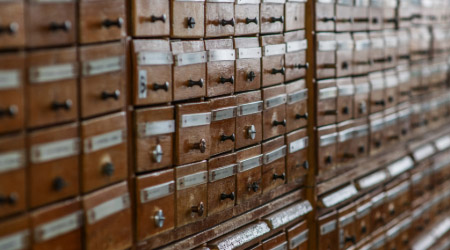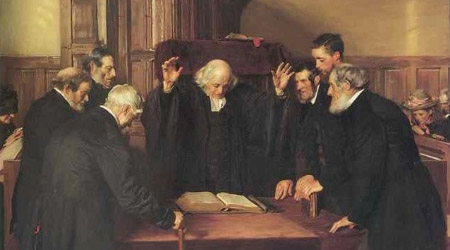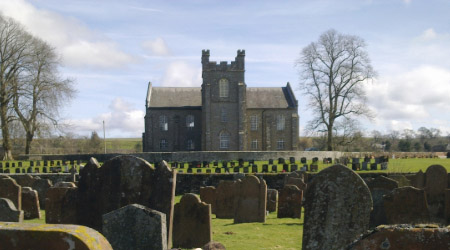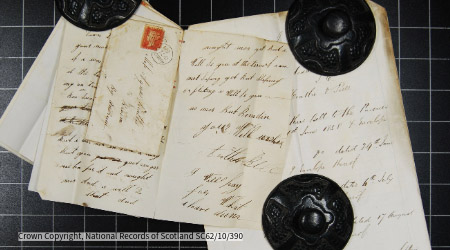Learning Zone - Registers of Deeds
The Register of Deeds of the Court of Session
Royal Burgh Registers of Deeds
Commissary Court Registers of Deeds
Local or Franchise Court Registers of Deeds
Deeds are really useful documents for genealogy researchers. In Scotland, a deed could be not just a document relating to property but rather one of a wide variety of legal agreements such as contracts or bonds. Although some deeds do relate to heritable property, all transactions relating to heritable property in Scotland were recorded in the Registers of Sasines, which are a separate set of records to the registers of deeds we will discuss here.
After making a legal agreement such as a marriage contract, tack (lease or tenancy agreement), indentures of apprenticeship, or a 'Trust Disposition & Settlement', someone could register their deed. For family history research in Scotland these are incredibly useful. Marriage contracts perhaps jump out as being very useful but all deeds give designations. A designation can often include the name of a person's father, their former residence or the name of some other relation. Witnesses are recorded, sometimes relatives, with their relationships being frequently mentioned.
Due to the expense of registering a deed, many were only registered when it became necessary. This means, for example, that a marriage contract can be recorded many years after the marriage. This adds to the challenge of finding deeds when they are not indexed.
Sometimes we can find a date and place of registration, for example, a will may mention a Trust Disposition and tell us that it was registered in the Books of Council and Session on a certain date. That enables us to go straight to the deed, even without an index. If you have a reference similar to this you can use our research service to have us retrieve the record for you.
Deeds could be registered in a variety of courts and which courts had the authority to register deeds changed over time. Our index is taken from a variety of sources, each entry has a clear source citation. What follows is a summary of the courts where deeds were registered with links to further information. Alternatively, feel free to jump straight into our index. You can see a breakdown of which records we have indexed here.
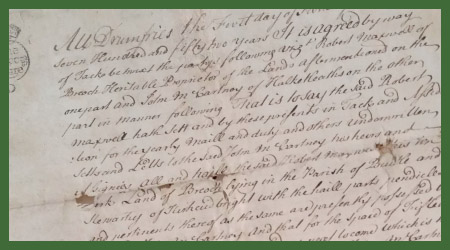
Search our index to Deeds |
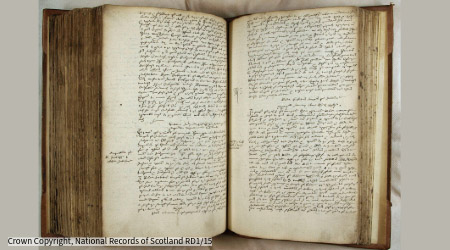
The Register of Deeds |
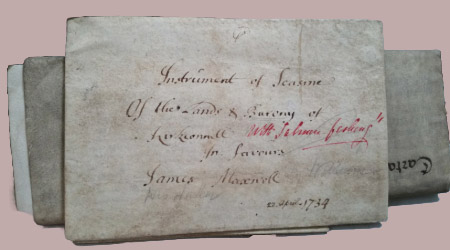
Registers of Sasines |
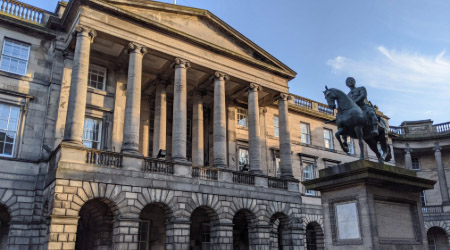
Court of Session Records Index |

Search our index to Deeds |
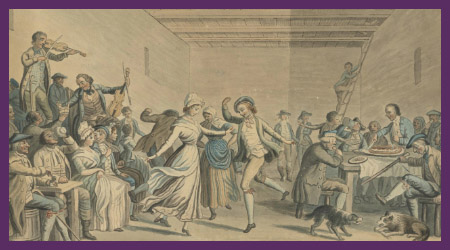
The Register of Deeds |

Registers of Sasines |

Court of Session Records Index |
The Register of Deeds of the Court of Session
Generally referred to as 'the Register of Deeds', you may also hear it called the Books of Council and Session. Both names refer to the same series of records.
The series dates back to 1554 and is still going to this day. Lengthy periods have been indexed which makes it easier to access. In contrast to other series of deeds, this collection covers all of Scotland. If you are looking for deeds and don't know which court a deed would have been registered in this is a good place to start. Find out more in our Learning Zone section 'The Register of Deeds'.
Sheriff Court Deeds
Registers of deeds and other material relating to deeds can be found in the Sheriff Courts. Not all Sheriff Courts maintained registers of deeds in the early period but often warrants survive. Warrants are the original documents which provided the basis for the copy which was entered in register volumes, and they often survive as loose documents tied up in bundles. Minute books can be used as a finding aid to help you identify a deed where no index exists. Sheriff Court deeds are held by the National Records of Scotland apart from those for Orkney and Shetland, which are held locally. We provide a research service to access unindexed deeds if you cannot visit yourself.
Royal Burgh Registers of Deeds
The National Records of Scotland hold deeds for almost half of the 66 royal burghs. Some Royal Burgh deeds are in local authority archives throughout Scotland.
Perth Burgh Register of Deeds has been digitised and are available on the fee-paying website Ancestry.com. You can view them here. Even if your ancestors are not from Perth it would be a useful exercise to view these and familiarise yourself with the type of documents you will find in other burghs.
To locate a local authority archive, see the Scottish Archives map on the website of the Scottish Council on Archives.
Commissary Court Registers of Deeds
Until 1809 there was also an option to register deeds in the commissary courts. These records are held in the National Records of Scotland (NRS reference CC).
Local or Franchise Court Registers of Deeds
Deeds survive for some local or franchise courts, which existed before the abolition of Heritable Jurisdictions in 1748. These include the following: The Regality of Atholl, Regality of Culross, Bailiary of Cunningham, Regality of Dunblane, Regality of Dunfermline, Barony and Regality of Dunkeld, Archbishopric, Barony and Regality of Glasgow, Regality of Huntly, Bailiary of Kelso, Regality of Kilwinning, Regality of Melrose and the Stewartry of Menteith.
These records are held by the National Records of Scotland but it may also be worth checking with the Local Authority Archive if you are looking for deeds registered in a franchise court.

